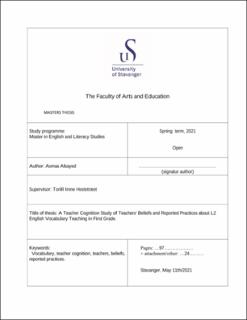A Teacher Cognition Study of Teachers' Beliefs and Reported Practices about L2 English Vocabulary Teaching in First Grade.
Master thesis
Permanent lenke
https://hdl.handle.net/11250/2779107Utgivelsesdato
2021Metadata
Vis full innførselSamlinger
- Student papers (HF-IKS) [910]
Sammendrag
AbstractThis study aims to examine the beliefs and the reported practices in the teaching of L2 English vocabulary in first grade in Norway. The research project applies a teacher cognition framework to study beliefs about vocabulary learning and reported vocabulary teaching practices. It is a qualitative study based on semi-structured interviews carried out with six English teachers.This study addresses the following research questions: “What beliefs do the teachers have about first grade L2 vocabulary learning?” “What are the teacher’s reported practices about the teaching of L2 vocabulary in first grade?” “To what extent do the reported practices promote incidental vocabulary learning and to what extent do they promote deliberate learning?” “What are the teachers' reported knowledge about the pupils’ vocabulary knowledgebefore they start school and how the teachers build on that knowledge?” “What are the challenges, the contextual factors that may face teachers, and what teaching materials are used to teach vocabulary to first grade?”The study revealed many findings. Firstly, the main finding concerning beliefs about teaching and learning vocabulary displayed that most of the teachers believed in using songs because of their many benefits in acquiring a new language. Furthermore, most of the teachers believed that pupils best learn vocabulary through using and practicing them. In addition to that, some teachers believed that vocabulary is best taught through using and playing games. Moreover, two teachers believed that vocabulary is best taught and learned by using visual aids and pictures to teach the new words. Further, only one teacher reported that she believes that vocabulary is best taught in a meaningful context with a lot of repetition. Additionally, only one teacher emphasized the importance of motivation. She believed that vocabulary is best taught by making pupils like the English subject. Finally, only one teacher believed that pupils best learn vocabulary through listening. Ultimately, by exploring the teachers’ beliefs, the study concluded that the teachers’ beliefs were in line with theories and recent researches on teaching and learning vocabulary to young learners.Secondly, Concerning the teachers’ reported practices, the study concluded that all teachers reported that they use songs, games, attached context, films, digital tools, flashcards, translate to L1 Further, most of the teacher reported that they use picturebooks, and only three teachers reported that they use oral storytelling. Ultimately, their practices seem to be in line with theories and recent research on teaching and learning vocabulary to young learners. Furthermore, their practices are determined by curriculum aims. Additionally, after examining their reported practices it was clear that they mainly used digital tools and most of the classroom activities were carried through the use of these.Thirdly, the findings indicate that teachers promote incidental learning to large extent, this is seen as incongruent with recent theory on the subject.Fourthly, all teachers reported that most of the pupils come with a lot of prior knowledge of the English vocabulary, and some of them can communicate using these words. In addition to that, all teachers reported that they take the pupils’ existing vocabulary knowledge into consideration when they teach, and they build on that knowledge by trying to know or figure out what the pupils already know in order to start from there.Fifthly, the study concluded that there are some challenges that the teachers face, for example, all teachers said that one of the challenges is that they do not have enough time. Further, only two teachers think that it is challenging to teach pupils in first grade how to read or write. On the other hand, only one teacher thinks that one of the most noteworthy challenges in vocabulary teaching is that some pupils have prior knowledge of the English vocabulary and some pupils never heard an English word. This situation creates a challenge for her to choose suitable text and vocabularies for everyone because it is easy for someone and it is difficult for someone else.
